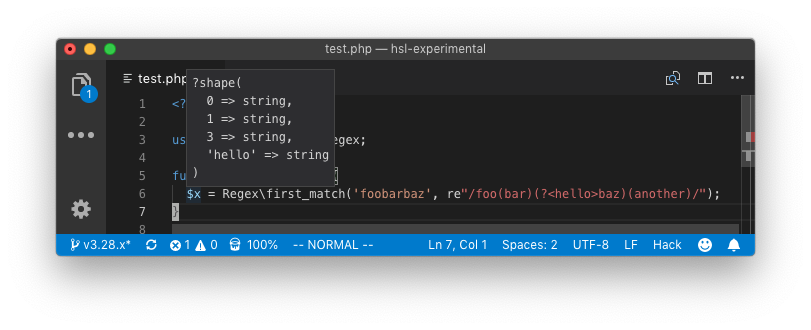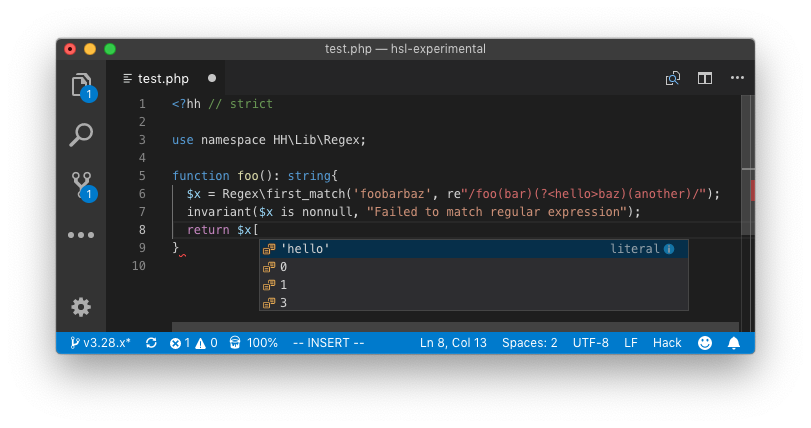HHVM 3.28.2 and 3.27.3
HHVM 3.28.2 contains bugfixes, and several features that weren’t quite ready for 3.28.0:
Bugfixes
- 3.27.3 and 3.28.2: handle EINTR when using HackC (common when using Xenon) - thanks to Keith Adams.
- 3.27.3 and 3.28.2: fix namespace resolution in anonymous classes when using HackC
- 3.28.2: Support single-line
ifstatements in hackfmt
Features and Improvements
- 3.27.3 and 3.28.2: provide better information on mouse hover in LSP editors and IDEs
- 3.28.2: Experimental: add
<<__Entrypoint>>, removing the need for pseudo-mains. Update: as of 3.30, this is now<<__EntryPoint>> - 3.28.2: Experimental: add regular expression support as a native type
«__Entrypoint»
This is a new attribute, marking a single function in a file as being the ‘main’ function for this file:
Update: as of 3.30, this attribute is now called <<__EntryPoint>>
1
2
3
4
5
6
7
8
9
10
11
12
<?hh // strict
<<__Entrypoint>>
function main(): noreturn {
exit(0);
}
// ... or ...
<<__Entrypoint>>
async function main(): Awaitable<noreturn> {
exit(0);
}
Entrypoint functions will be automatically executed if they are in the top-level file; they will not be automatically executed if the file is included via include, require, or the autoloader.
Like other functions in Hack, the function names must be unique within your project - i.e. projects with multiple entrypoints can not call both ‘main’.
Open Issues
- We have not yet finalized the signature of these functions; no parameters are passed, and the return value (if any) is ignored. We are likely to require
noreturnorAwaitable<noreturn>in a future release, and we recommend using these types for now. - We have not yet established a Hack API for accessing request data or argv; for now, we recommend using partial-mode Hack wrappers around existing PHP interfaces, such as
$_GLOBALS['argv']; in a later release, we are likely to expose this via a function, possibly calledHH\Request\argv(); we welcome feedback and suggestions for this API
Regular Expressions
This feature is a combination of a new language feature, and new library functions; the library functions are currently in the hsl-experimental package, and we expect them to move to the main HSL package in a future release.
Regular expressions take advantage of a new Hack feature called prefix strings. Prefix strings allow the user to tag string literals, giving the typechecker more information.
In the Regex\ namespace, a regular expression is represented by the Pattern type instead of a string. A Pattern is obtained by using a re-prefixed string literal:
1
$pattern = re"/foo(bar)?/";
Now, the typechecker knows that the string is a regular expression! This means that it can warn us at typecheck time if we have written a malformed pattern:
1
2
3
4
5
$pattern = re"I am not a regular expression";
// ERROR: Bad regex pattern; Missing delimiter(s). (Typing[4275])
$pattern = re"/(no closing paren/";
// ERROR: Bad regex pattern; Missing ) [17]. (Typing[4275])
Furthermore, the Pattern type has a type parameter which represents the shape of a match (containing positional and named capture groups), and the Regex\ APIs return this shape. This means that the keys of the shape are also known at typecheck time:
1
2
3
4
5
6
7
8
9
10
11
12
13
use namespace HH\Lib\Regex;
$match = Regex\first_match(
$some_string,
re"/^(positional)and(?<named>foo)$/"
);
if ($match is nonnull) {
$match[0]; // OK, full matched string
$match[1]; // OK, first positional group
$match['named']; // OK, named group
$match['nonexistent']; // ERROR: The field nonexistent is undefined (Typing[4108])
}
If a capture group isn’t matched in the input string, the value for its key will be set to the empty string.
Regular expressions matches are supported by existing IDE features, such as type-on-hover and shape key autocomplete:


For the full API, see the source; it will join the main HSL documentation once the feature is no longer experimental.
Limitations
For now, the prefix string is the only way to obtain a Pattern, meaning this library only works with statically known regular expressions. We will be introducing support for dynamic patterns soon.
The Regex\ namespace requires limited forms of two new Hack features: prefix strings and integer keys on shapes.
- For now, only regular expressions may use prefix strings. The Hack team is considering generalizing the prefix string feature, but it’s unlikely to happen this half.
- Because shapes are darrays under the hood, we are still disallowing user-defined shapes to define integer keys due to intish string array key coercion.
Thanks
Thanks to Marcy Park for building this feature, and Christopher Chedeau, Fred Emmott, Robert Lynch, and Kunal Mehta for API design.
